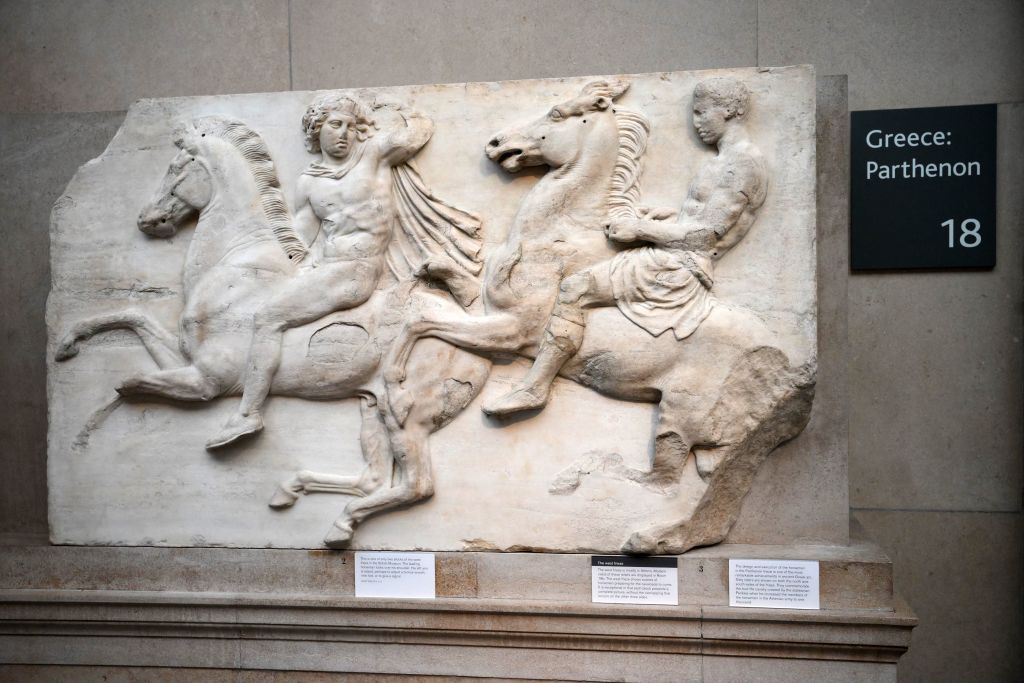It is safe to say that there is very little chance of the Elgin Marbles turning up for sale on eBay anytime soon. Even those charged with running the British Museum, currently embroiled in a growing scandal over stolen and missing artefacts, would presumably spot them on the site.
That is why it is simply laughable for Greek experts to claim the precious sculptures are at risk after the embarrassing disclosure of a series of thefts from the institution. Leading the charge is Despina Koutsoumba, the head of the Association of Greek Archaeologists, who argues the marbles would be far safer off in Greece. Well, she would think that, wouldn’t she?
The Greeks certainly do their campaign for restitution no great service by resorting to such absurd arguments
Greece has long demanded the return of the ancient treasures, which were taken in the 19th century. Tim Loughton, who chairs the all-party parliamentary group on the British Museum, spoke for sensible people everywhere when he accused Greece of ‘blatant opportunism’ in making these ridiculous claims. The Greeks certainly do their campaign for restitution no great service by resorting to such absurd arguments.
Even so, this should not disguise the real and growing crisis faced by the British Museum over its inept handling of the missing artefacts scandal. Those running the institution are vulnerable to the charge of being asleep at the wheel as well as making matters worse by being less than forthcoming in their public statements — an indefensible attitude on the part of such a prestigious cultural institution.
Crucial information has instead emerged in dribs and drabs. The museum disclosed last week that items from its collection were missing. It said that the items were ‘small pieces’ and included jewellery, glass and gems of semi-precious stones. Some of have ended up on eBay, others are reported ‘missing, stolen or damaged’. It still isn’t clear exactly how many artefacts have been taken. There have been unconfirmed reports that the thefts happened over at least two decades and that as many as 2,000 items could have been stolen, worth millions of pounds. Peter Higgs, a senior curator, has been sacked. He has denied any wrongdoing, and the museum has refused to state on what grounds he was dismissed.
The police were called in to investigate the thefts in January yet the museum sat on this information until this month. In fact, few details have been confirmed about precisely what happened, how long it has been going on, or how it was allowed to happen.
There may be good reasons behind this policy of omertà. The police investigation is still ongoing and so far there have been no charges. The museum has launched its own internal security review. It insists everyone in a senior leadership position at the institution is taking the matter extremely seriously and that lessons will be learnt. This feels inadequate as a public response. If anything, the British Museum has appeared leaderless and rudderless throughout this affair. That is probably because it is. Days after the thefts were revealed, Hartwig Fischer, the museum’s German-born director, announced that he was leaving next year. The museum denied suggestions that his departure is linked to the scandal. Even so his leaving came out of the blue. It now falls on the museum’s chairman, George Osborne, to lead the process of finding a successor. Osborne, a former chancellor, has only been in post for just over two years. This scandal can only add to the wider public perception that many cultural institutions and those leading them have taken their eye off the ball in recent years. Instead, they have been caught up in debates and rows over funding and sponsorship, as well as other ‘culture war’ issues such as the provenance of their collections. In the case of the British Museum this has meant a public and acrimonious battle over its links with the oil giant BP as well as arguments over whether the Elgin Marbles should be returned to Greece.
These issues have consumed far too much time and attention to very little benefit, and the consequences are plain to see. It bears pointing out that the British Museum’s only duty is to look after the precious items in its care, display them to the public, and encourage scholarship that enriches knowledge about its unrivalled collections. Museums must return – quickly – to focusing on what they do best. That’s the real lesson here.







Comments